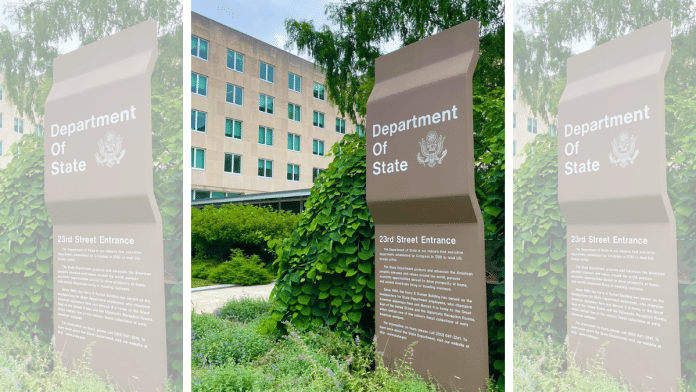New Delhi: The US State Department’s 2024 Country Report on Human Rights Practices has flagged transnational repression by the Indian government as a growing concern, along with arbitrary detentions, press restrictions, suppression of dissent, and human rights violations in the ethnic violence in Manipur.
The report, submitted annually to the US Congress, documents serious human rights issues in countries throughout the year. For India, the new report alleges that the government has taken “minimal credible steps” to hold perpetrators of such abuses accountable.
Transnational repression has emerged as a central issue in the report, among others, wherein the report cites “credible accounts” of Indian authorities allegedly targeting civil society leaders, journalists, labour activists, and academics abroad.
Specific concerns include the revocation of Overseas Citizenship of India (OCI) status, travel restrictions, abuses of Interpol protocols, and online harassment and surveillance.
In response, the Indian government has consistently rejected allegations of human rights violations and transnational repression. Following last year’s U.S. human rights report, the Ministry of External Affairs (MEA) dismissed the findings as “deeply biased” and claimed they reflected a “poor understanding of India’s constitutional framework and democratic ethos.”
A similar stance was taken this month, when New Delhi categorically rejected a UK parliamentary committee report that listed India among nations accused of transnational repression. MEA spokesperson Randhir Jaiswal criticised the UK report for relying on “dubious” sources such as Sikhs for Justice (SFJ), a pro-Khalistan group banned in India, and accused the committee of undermining its credibility.
The case in point was the assassination of Hardeep Singh Nijjar, a Canadian Sikh separatist leader, in British Columbia in June 2023 which triggered a major diplomatic fallout between India and Canada. In May 2024, three Indian nationals were arrested in Canada in connection with Nijjar’s murder.
Similarly, Gurpatwant Singh Pannun, another prominent Khalistani separatist based in the US, was allegedly the target of a foiled assassination plot where later American officials linked the attempt to individuals with ties to the Indian government.
The UK report had listed India alongside China, Russia, Iran, and Pakistan as countries accused of targeting journalists, dissidents, and activists on British soil.
The US report, which does not mention these cases, says: “Civil society activists noted the blocking of social media accounts in India, takedown requests, and proliferation of conspiracy theories as examples of transnational repression against diaspora activists working to advance human rights and religious freedom.”
Beyond transnational repression, it also raised serious concerns about press freedom, arbitrary detentions, and torture within India. It documented a pattern of harassment against journalists, particularly those reporting on corruption, human rights abuses, or ethnic conflict, including intimidation by both state and non-state actors.
One growing area of concern, according to the report released Wednesday, is according to Freedom House’s 2024 Special Report on Freedom of Movement, is the government’s use of travel document restrictions as a tool of control. In addition to scrutiny over passports, the report details a rising number of revocations of OCI status, a visa-like privilege granted to people of Indian origin and their spouses.
According to the report, between 2014 and May 2023, at least 102 individuals had their OCI status revoked, including journalists, academics, and activists. Those stripped of OCI status are often banned from reentering the country.
The report also references allegations of Indian abuse of Interpol protocols, including issuing unwarranted “blue notices”, a tool for gathering information on individuals of interest.
It mentions how a lawyer interviewed in a February media investigation claimed to have successfully blocked several such notices originating from India due to violations of Interpol rules. The Indian government, in response, labeled these allegations “vague and unsubstantiated,” the report mentioned.
(Edited by Tony Rai)







But what about stray dogs? Does the report not mention the cruelty and inhuman treatment of stray dogs by Indian society and judiciary?
Are animal rights not just as important as human rights? Shame on the US State Department!